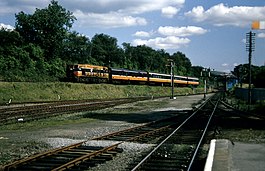Mallow–Tralee railway line
| Mallow–Tralee | |||||||||||||||||||||||||||||||||||||||||||||||||||||||||||||||||||||||||||||||||||||||||||||||||||||||||||||||||||||||||||||||||||||||||||||||||||||||||||||||||||||||||||||||
|---|---|---|---|---|---|---|---|---|---|---|---|---|---|---|---|---|---|---|---|---|---|---|---|---|---|---|---|---|---|---|---|---|---|---|---|---|---|---|---|---|---|---|---|---|---|---|---|---|---|---|---|---|---|---|---|---|---|---|---|---|---|---|---|---|---|---|---|---|---|---|---|---|---|---|---|---|---|---|---|---|---|---|---|---|---|---|---|---|---|---|---|---|---|---|---|---|---|---|---|---|---|---|---|---|---|---|---|---|---|---|---|---|---|---|---|---|---|---|---|---|---|---|---|---|---|---|---|---|---|---|---|---|---|---|---|---|---|---|---|---|---|---|---|---|---|---|---|---|---|---|---|---|---|---|---|---|---|---|---|---|---|---|---|---|---|---|---|---|---|---|---|---|---|---|---|
 Service from Cork after reversing out of Killarney station to continue forwards to Tralee | |||||||||||||||||||||||||||||||||||||||||||||||||||||||||||||||||||||||||||||||||||||||||||||||||||||||||||||||||||||||||||||||||||||||||||||||||||||||||||||||||||||||||||||||
| Overview | |||||||||||||||||||||||||||||||||||||||||||||||||||||||||||||||||||||||||||||||||||||||||||||||||||||||||||||||||||||||||||||||||||||||||||||||||||||||||||||||||||||||||||||||
| Status | Operational | ||||||||||||||||||||||||||||||||||||||||||||||||||||||||||||||||||||||||||||||||||||||||||||||||||||||||||||||||||||||||||||||||||||||||||||||||||||||||||||||||||||||||||||||
| Locale | County Cork, County Kerry | ||||||||||||||||||||||||||||||||||||||||||||||||||||||||||||||||||||||||||||||||||||||||||||||||||||||||||||||||||||||||||||||||||||||||||||||||||||||||||||||||||||||||||||||
| Termini | |||||||||||||||||||||||||||||||||||||||||||||||||||||||||||||||||||||||||||||||||||||||||||||||||||||||||||||||||||||||||||||||||||||||||||||||||||||||||||||||||||||||||||||||
| Stations | 7 | ||||||||||||||||||||||||||||||||||||||||||||||||||||||||||||||||||||||||||||||||||||||||||||||||||||||||||||||||||||||||||||||||||||||||||||||||||||||||||||||||||||||||||||||
| Service | |||||||||||||||||||||||||||||||||||||||||||||||||||||||||||||||||||||||||||||||||||||||||||||||||||||||||||||||||||||||||||||||||||||||||||||||||||||||||||||||||||||||||||||||
| Type | Heavy rail, Inter-city rail | ||||||||||||||||||||||||||||||||||||||||||||||||||||||||||||||||||||||||||||||||||||||||||||||||||||||||||||||||||||||||||||||||||||||||||||||||||||||||||||||||||||||||||||||
| System | Iarnród Éireann | ||||||||||||||||||||||||||||||||||||||||||||||||||||||||||||||||||||||||||||||||||||||||||||||||||||||||||||||||||||||||||||||||||||||||||||||||||||||||||||||||||||||||||||||
| Services | Mallow–Tralee Dublin–Tralee Cork–Tralee | ||||||||||||||||||||||||||||||||||||||||||||||||||||||||||||||||||||||||||||||||||||||||||||||||||||||||||||||||||||||||||||||||||||||||||||||||||||||||||||||||||||||||||||||
| Operator(s) | Iarnród Éireann | ||||||||||||||||||||||||||||||||||||||||||||||||||||||||||||||||||||||||||||||||||||||||||||||||||||||||||||||||||||||||||||||||||||||||||||||||||||||||||||||||||||||||||||||
| Rolling stock | 22000 Class | ||||||||||||||||||||||||||||||||||||||||||||||||||||||||||||||||||||||||||||||||||||||||||||||||||||||||||||||||||||||||||||||||||||||||||||||||||||||||||||||||||||||||||||||
| History | |||||||||||||||||||||||||||||||||||||||||||||||||||||||||||||||||||||||||||||||||||||||||||||||||||||||||||||||||||||||||||||||||||||||||||||||||||||||||||||||||||||||||||||||
| Opened | 15 July 1853 | ||||||||||||||||||||||||||||||||||||||||||||||||||||||||||||||||||||||||||||||||||||||||||||||||||||||||||||||||||||||||||||||||||||||||||||||||||||||||||||||||||||||||||||||
| Technical | |||||||||||||||||||||||||||||||||||||||||||||||||||||||||||||||||||||||||||||||||||||||||||||||||||||||||||||||||||||||||||||||||||||||||||||||||||||||||||||||||||||||||||||||
| Line length | 61.5 mi (99.0 km) | ||||||||||||||||||||||||||||||||||||||||||||||||||||||||||||||||||||||||||||||||||||||||||||||||||||||||||||||||||||||||||||||||||||||||||||||||||||||||||||||||||||||||||||||
| Number of tracks | Single track | ||||||||||||||||||||||||||||||||||||||||||||||||||||||||||||||||||||||||||||||||||||||||||||||||||||||||||||||||||||||||||||||||||||||||||||||||||||||||||||||||||||||||||||||
| Track gauge | 1,600 mm (5 ft 3 in) Irish gauge | ||||||||||||||||||||||||||||||||||||||||||||||||||||||||||||||||||||||||||||||||||||||||||||||||||||||||||||||||||||||||||||||||||||||||||||||||||||||||||||||||||||||||||||||
| Operating speed | 70 mph (110 km/h) | ||||||||||||||||||||||||||||||||||||||||||||||||||||||||||||||||||||||||||||||||||||||||||||||||||||||||||||||||||||||||||||||||||||||||||||||||||||||||||||||||||||||||||||||
| |||||||||||||||||||||||||||||||||||||||||||||||||||||||||||||||||||||||||||||||||||||||||||||||||||||||||||||||||||||||||||||||||||||||||||||||||||||||||||||||||||||||||||||||
The Mallow–Tralee line runs from Mallow to Tralee Casement. Intermediate stations include Banteer, Millstreet, Rathmore, Killarney and Farranfore.
A peculiar arrangement at Killarney is in place, in which trains from Mallow enter Killarney, which is a dead-end. Trains continuing to Tralee then have to reverse until they reach the junction, before changing direction again to continue westwards.[1]
Irish Rail's network statement gives the length of the line as 61.5 miles (99.0 km),[2] though other sources give the length of the line as 62+1⁄4 miles instead.[3] The line from Mallow to Killarney was noted for severe gradients compared to the line from Dublin to Mallow though the Killarney expresses of 1899 were timed to achieve the section at 40.75 miles per hour (65.58 km/h) westbound and 38.2 miles per hour (61.5 km/h) eastbound.[3]
History
The Killarney Junction Railway (KJR) completed the construction of the line from Mallow to the holiday resort of Killarney in 1853. The Tralee & Killarney Railway opened the extension from Killarney junction to Tralee in 1859.[4] The Great Southern and Western Railway (GS&WR) who had invested in both companies absorbed them both in 1860.[1]
At Tralee there were small sidings that were convenient to those of the narrow gauge Tralee and Dingle Light Railway. There was also links beyond the road to the marshalling yards, the branch to Fenit, and the Limerick–Tralee line.[5]
Rolling stock
Alexander McDonnell GS&WR Class 2 Kerry bogies were specifically intended for passenger services on the line.[6] There was a trial of a Drumm Battery Train with temporary charging points set up on the line during the late 1930s or 1940s.[7] 22000 Class ICR railcars first began passenger services on the line in September 2008.[8]
Branches

Castleisland
The 4 miles (6.4 km) long Castleisland branch connected to the main line at Gortalea at a junction facing Tralee. It closed in 1974.[9] Alexander McDonnell designed a combined engine and carriage, the GS&WR Class 90, to work the branch.[6]
Kenmare
The branch to Kenmare was about 20 miles (32 km) long and was opened on 4 September 1893.[1] It closed on 1 February 1960.[4][10][11]
Newmarket
There was a 8+3⁄4 miles (14.1 km) branch to Newmarket from Banteer with an intermediate station at Kanturk.[12] The line opened on 1 April 1889 which closed to passengers on 27 January 1947 and completely on 1 January 1963,[1] though other sources say 4 February 1963.[4]
Valentia
The terminus on the branch to Valentia Harbour was further west than any in Europe.[9]
Rail Air Link
The railway passes close by to Kerry Airport, with the station at Farranfore being located about 1 mile (1.6 km) away.[13][14]
References
- ^ a b c d Murray, K. A.; McNeil, D.B. (1976). The Great Southern & Western Railway. Irish Record Railway Society. pp. 26–29, 58–59, 186–188, 195. ISBN 0904078051.
- ^ Reidy, Michael (30 October 2021). Network Statement (PDF) (2022 ed.). Irish Rail. pp. 75–. Retrieved 21 September 2022.
- ^ a b Ahrons, E. L. (1954). L. L. Asher (ed.). Locomotive and train working in the latter part of the nineteenth century. Vol. six. W Heffer & Sons Ltd. pp. 21, 25–26.
- ^ a b c "Kanturk station" (PDF). Railscot – Irish Railways. Retrieved 16 October 2007.
- ^ "Tralee & Dingle Light Railway — Maps". Chester Model Railways Club. Archived from the original on 28 June 2016. Retrieved 18 July 2018.
- ^ a b Bulleid, H.A.V. (1967). The Aspinall Era. Ian Allan, London. pp. 38–39, 73.
- ^ Baker, Michael H.C. (1972). Irish Railways Since 1916. Shepperton: Ian Allan. pp. 101–102. ISBN 0-7110-0282-7.
- ^ "Journal 168 Operations". Irish Railway Record Society. 23 (168). February 2009. Archived from the original on 4 December 2017. Retrieved 19 July 2019.
- ^ a b Baker, H. C. (1995). Ireland's Railways Past and Present - Ireland - An Introduction (2005 ed.). Past and Present Publishing Ltd. p. 68,69. ISBN 1858952468.
- ^ "Kenmare's Last Train – Amharc Éireann: Eagrán 32". Irish Film Institute. 18 July 2016.
On the 1st of February 1960, Kenmare locals and railway workers looked on as the last train made its final journey on the tracks before the line closed
- ^ "36 hours in Kenmare". irishtimes.com. Irish Times. 6 August 2023. Retrieved 8 March 2023.
the last train out of Kenmare [was] on February 1st, 1960, at 9.30am. The railway had opened in 1893, and the Kenmare branch line was the last stop on the Great Southern and Western Railway route
- ^ "Newmarket Railway". áth trasna. Archived from the original on 16 October 2018. Retrieved 18 July 2019.
- ^ "Kerry Airport". Discover Kerry. Travel Ireland. Retrieved 10 May 2021.
- ^ "Farranfore". irishrail.ie. Irish Rail. Retrieved 22 September 2022.
